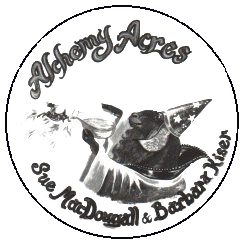
Alchemy Acres
presents
Tip of the Month








Parts of this article were first printed in the Tennessee Cooperator - the magazine of my local Co-op.The parts that were "filched" were written by David Martin. This topic of how to prepare for the cold weather seems particularly appropriate for this time of year - even here in the South. I've lived thru the cold weather of Minnesota, Michigan, Wisconsin, Illinois, Texas, and New Mexico (-40 degrees there), but the cold of Tennessee is always damp, and goes straight to the bone. So it behooves us all to take precautions for ourselves and our animals so that all and sundry remain healthy and happy.
Serious cold-related injuries and illnesses can occur when the body loses the ability to warm itself, a condition known as hypothermia. It can result in permanent tissue damage, and even death. Hypothermia can slowly overcome a person or animal whose body has been chilled by low temperatures, a brisk wind, or wet clothing (or hair-coat). The symptoms of hypothermia include fatigue, drowsiness, uncontrolled shivering, cool bluish skin (in humans), slurred speech, clumsy movements, and irratable, irrational, or confused behavior. Frostbite usually affects the extremities: fingers, toes, hands, feet, ears and nose. When deep layers of skin and tissue freeze, the skin becomes hard and numb and looks pale and waxy white. Often the only treatment for severely frostbitten flesh or limbs is amputation. For those of us with nubians, be particularly careful of those long floppy (and vulnerable) ears of which we are all so fond!! Obviously, we all want to avoid such dire consequences as amputation- both for ourselves and our animals.
As colder weather approaches, you can help to protect yourself and your charges by following the following guidelines suggested by OSHA:
- Be aware of changing weather conditions and prepare for them. This means bringing your animals to shelter from the wind, rain, or snow. Provide extra rations of grain and particularly hay or roughage. The rumination process produces a substantial amount of extra body heat, and helps your goats to keep warm. We also carry hot water to the animals twice daily during really severe weather. They seem to appreciate this extra effort on our part, as those buckets are vaccumed dry in no time flat. I find myself having to bring twice the water if it is ladeled up hot. And it helps to provide a thick layer of warm, dry bedding. We usually bed our animals on a floor of dry, clean agricultural lime. But in the winter, we keep one area covered with the "waste" hay. The soft, dry lounging and sleeping area seems to be most appreciated, as I find the dogs and the goats all cozied up together snoozing on the hay.
- Learn the signs and symptoms of hypothermia and frostbite and the first-aid procedures appropriate for their treatment. An example is to treat mild frostbite with luke warm water - as opposed to hot water. Always dry the treated limb thoroughly, also. And have the number of your veterinarian handy so you can receive timely advice on helpful treatments.
- Select proper clothing for cold, wet, or windy conditions. A hat and gloves (I prefer mittons in extremely cold weather) will help to keep extremities warm, while polypropylene underware will keep water away from the skin. Layers of clothing not only keep you warmer, but also make it easier to adjust to changing temperatures and conditions. Its a heck of a lot better to prevent frostbite and hypothermia than to have to treat the conditions after you have a crisis.
- The colder the weather, the more often you should take short breaks in the house to allow your body to thaw out, as it were.
- Whenever possible, schedule work for the warmest part of the day. As the keeper of animals who expect to be fed early in the morning (and in the evening as well), I don't have the option of waiting 'til early afternoon to do the routine chores. However, I always schedule repair jobs (other than emergencies) for warmer days. I look around for things that may need attention and try to fix them before there is a blizzard or some other unpleasant set of circumstances in which I do NOT want to work.
- Because the body uses energy to keep muscles warm, avoid fatigue or exhaustion.
- Keep your body energized with warm, sweet beverages such as cocoa or sports drinks, and warm, high calorie, high carbohydrate foods such as pastas. Avoid caffeine and alcohol (I confess - I must have my caffeine "fixes" throughout the day - but I don't tank up just prior to going out to do the chores). Your goats will also like a sweet drink - say some Gatorade added to their hot water. You have to be careful to not add so much sweet stuff that you screw up their rumination, which is why we try to add it along with electrolytes.
- Use the buddy system. Always work with at least one other person. Keep an eye on one another to check for symptoms of severe exposure.
So by using a large dollop of common sense, we should be able to care for our animals and farms without doing ourselves in. Hope you all had a very safe and happy holiday, and that you have a happy and peaceful New Year. We'll "see" you all next month.
Write us with your comments and suggestions.
































